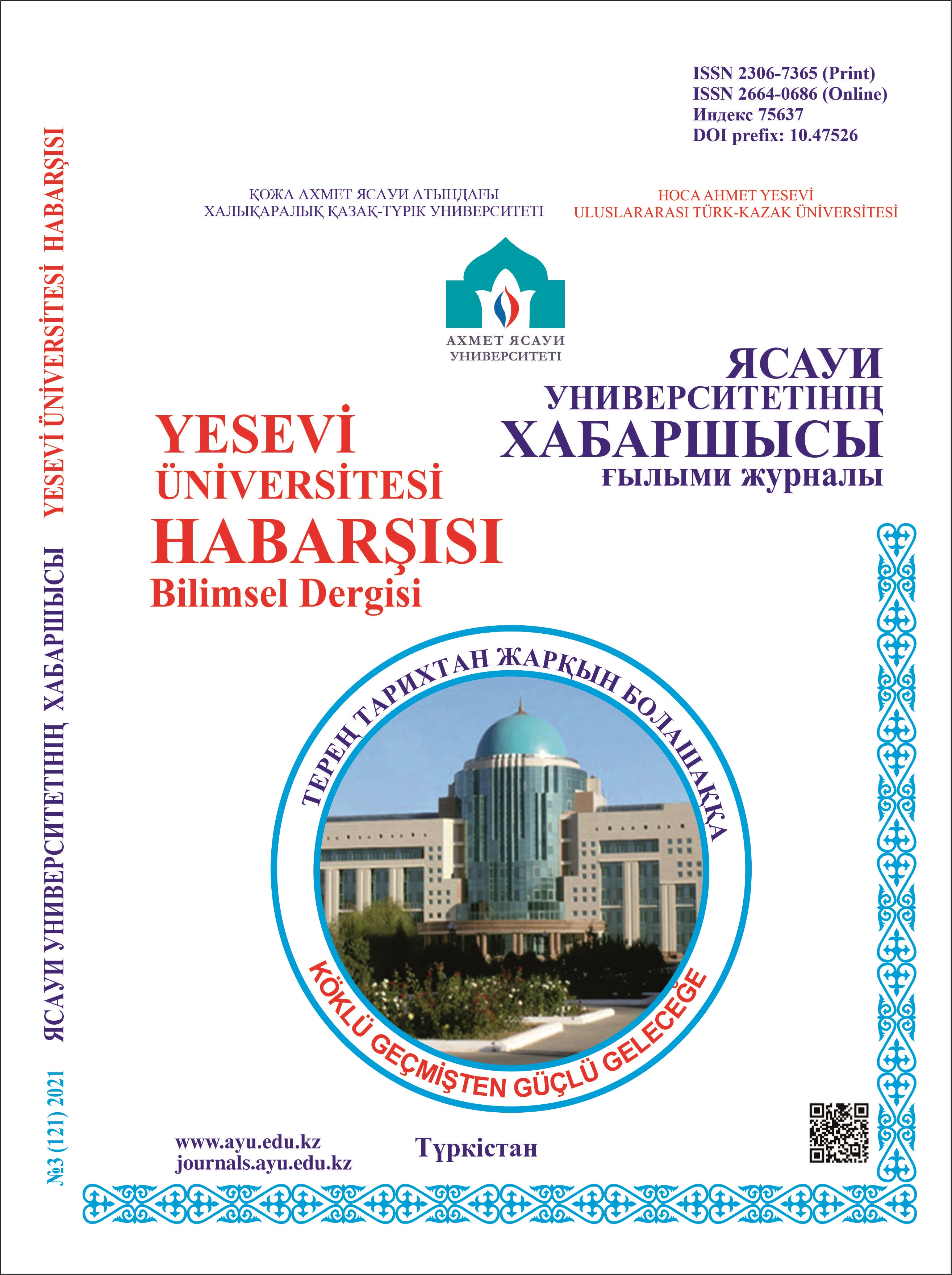Karasakal Erimbet's Epic «Abu Shashma»: Islamic Worldview and Principle of Justice
49 72
Keywords:
Islamic worldview, principles, Sharia laws, purity of the soul, religious philosophy, Eastern plot, Muslim culture.Abstract
This article examines the thematic and ideological features and structure of Karasakal Erimbet's epic «Abu Shashma». Scientific conclusions about the Islamic worldview in the epic are analyzed. Islamic perspectives, principles of justice, and civil stance are clarified. The influence of Muslim culture on the poet's thoughts regarding the purity of the soul, spirit, and repentance in adhering to the laws of Sharia is also discussed.
The characters in the epic, such as Omar, are portrayed as just and unwavering in following Allah's commands, while Abu Shashma acknowledges his sins and proves his repentance with clear evidence.
The article reveals the religious and philosophical depth that advocates the power of Islam. The religious-ethical content of the epic "Abu Shashma" is analyzed. The author's demonstration of faith, justice, and the fulfillment of Sharia laws is made clear through examples.
The epic pays attention to the Eastern model and the principles of Kazakh national literary art. It reveals the significance of Islamic values, the strength of religious faith, justice, and the implementation of Sharia laws, as well as their moral teachings and relevance in the modern world.
The literary connections, influences, and continuity with Muslim culture in the Eastern-themed epic are explored. Karasakal Erimbet preached the power of Islam and emphasized the importance of sincere repentance for spiritual purification.
The epic is systematically analyzed from a literary-theoretical perspective, with a focus on revealing its moral and cognitive value.
References
ПАЙДАЛАНЫЛҒАН ӘДЕБИЕТТЕР ТІЗІМІ
Тулебаева А.Т. Сыр бойы ақын-жыраулары поэзиясындағы философиялық дүниетаным және педагогикалық көзқарастар: Философия докторы (PhD) ... дис. – Қызылорда, 2024. – 197 б. 2. Жанбершиева Ұ., Оралова Г.С., Төлебаева А.Т., Камишева Г.А. Сыр сүлейлерінің (Тұрмағамбет, Жүсіп, Омар) мысал өлеңдеріндегі Шығыстық дәстүр // Л.Н. Гумилев атындағы ЕҰУ Хабаршысы. Филология сериясы. – 2023. – №4(145). – Б. 121–131.
Оралова Г., Жанбершиева Ұ., Төлебаева А. Сыр сүлейлері шығармаларындағы діни-ағартушылық идея. – Қызылорда: Тұмар, 2024. – 248 б.
Қазақ әдебиетіндегі кітаби ақындар дәстүрі. Халықаралық ғылыми-теориялық конференция жинағы. – Түркістан: Тұран, 2009. – 380 б.
Ерімбет Көлдейбекұлы. Ұлағат сөзім ұрпаққа. – Алматы: Маржан, 1995. – 302 б.
Күмісбаев Ө. Алтын қазық. – Алматы: Қайнар, 2012. – 512 б.
Кәрібозұлы Б., Игенбаева Р. Сыр сүлейлері шығармаларының ұлттық, тәлім-тәрбиелік тағылымы: ғылыми-танымдық кітап. – Алматы: Арыс, 2019. – 168 б.
Құран Кәрім, қазақша мағына және түсінігі / Ауд. Халифа Алтай. – Сауд Арабия. Мәдине, 1991. – 51 б.
Кәрібозұлы Б., Апенов Б. Сыр сүлейлері шығармаларындағы ұлттық дүниетаным сипаты: ғылыми-танымдық кітап. – Алматы: Арыс, 2018. – 128 б.
Кәрібозұлы Б., Әпенов Б., Игенбаева Р. Сыр сүлейлерінің әдеби мұрасы: монография. –Алматы: Қазақ тілі, 2020. – 320 б.
REFERENCES
Tulebaeva A.T. Syr boiy aqyn-zhyraulary poeziasyndagy filosofialyq dunietanym zhane pedagogikalyq kozqarastar: Filosofia doktory (PhD) ... dis. [Philosophical worldview and pedagogical approaches in the poetry of the poet-Zhyrau along the Syr Darya: dis.]. – Qyzylorda, 2024. – 197 b. [in Kazakh]
Zhanbershieva U., Oralova G.S., Tolebaeva A.T., Kamisheva G.A. Syr suleilerіnіn (Turmagambet, Zhusіp, Omar) mysal olenderіndegі Shygystyq dastur [The Eastern tradition in the verses of the Akyns of the Syrdarya (Turmagambet, Zhusup, Omar)] // L.N. Gumilev atyndagy EUU Habarshysy. Filologia seriasy. – 2023. – №4(145). – B. 121–131. [in Kazakh]
Oralova G., Zhanbershieva U., Tolebaeva A. Syr suleilerі shygarmalaryndagy dіni-agartushylyq ideia [Religious and educational idea in the works of the Akyns of Syrdarya]. – Qyzylorda: Tumar, 2024. – 248 b. [in Kazakh] 4. Qazaq adebietіndegі kіtabi aqyndar dasturі [Traditions of book poets in Kazakh literature]. Halyqaralyq gylymi-teorialyq konferencia zhinagy. – Turkіstan: Turan, 2009. – 380 b. [in Kazakh]
Erіmbet Koldeibekuly. Ulagat sozіm urpaqqa [My proverb to posterity]. – Almaty: Marzhan, 1995. – 302 b. [in Kazakh]
Kumіsbaev O. Altyn qazyq [The Golden Peg]. – Almaty: Qainar, 2012. – 512 b. [in Kazakh]
Karіbozuly B., Igenbaeva R. Syr suleilerі shygarmalarynyn ulttyq, talіm-tarbielіk tagylymy: gylymi-tanymdyq kіtap [National, educational and educational teachings of the works of the Akyns of Syrdarya: a scientific and educational book]. – Almaty: Arys, 2019. – 168 b. [in Kazakh]
Quran Karіm, qazaqsha magyna zhane tusіnіgі [The Quran, the meaning and concept of the Kazakh language] / Aud. Halifa Altai. – Saud Arabia. Madine, 1991. – 51 b. [in Kazakh]
Karіbozuly B., Apenov B. Syr suleilerі shygarmalaryndagy ulttyq dunietanym sipaty: gylymi-tanymdyq kіtap [The nature of the national worldview in the works of the Akyns of Syrdarya: a scientific and educational book]. – Almaty: Arys, 2018. – 128 b. [in Kazakh]
Karіbozuly B., Apenov B., Igenbaeva R. Syr suleilerіnіn adebi murasy: monografia [Literary heritage of the Akyns of Syrdarya: a monograph]. –Almaty: Qazaq tіlі, 2020. – 320 b. [in Kazakh]

